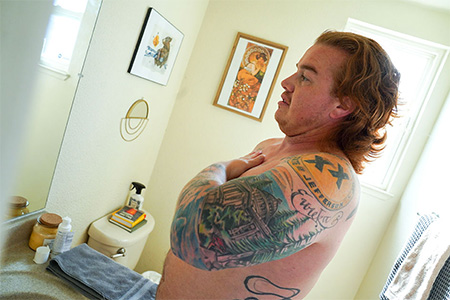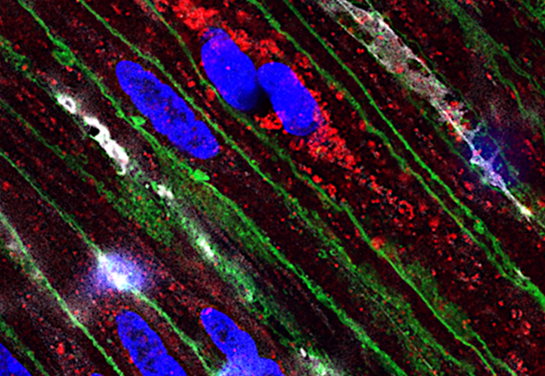Male hormonal birth control? It may be closer than you think
Matthew Treviño and Emily Fletcher are self-described DINKWADs — double income, no kids, with a dog. The Sacramento couple, who met and work at UC Davis, are as committed to each other as they are to not having children, which makes reliable birth control especially important. But except for condoms or a vasectomy, all birth control options currently available are for women. Treviño, 35, and Fletcher, 28, believe contraception should be more of a shared responsibility.

“Maybe the burden is on the wrong side,” said Treviño. “I kind of think it’s unfair, that it only lands on the women.”
They have been participating in a clinical trial at UC Davis Health to test a reversible hormonal birth control gel for men. If successful, male hormonal birth control has the potential to make the responsibility of contraception more equitable. The clinical trial, funded by the National Institutes of Health and taking place at sites around the world, is currently in its fourth year at UC Davis Health.
The hormonal gel, developed by the Population Council and the NIH, is applied to the shoulders and works by suppressing sperm production while maintaining testosterone levels. The gel works with the same principles as female hormonal birth control, which uses two hormones —progestin and estrogen— to prevent pregnancy.
“The gel has a progestin called Nesterone, which prevents the testes from making sperm,” explained Mitchell Creinin, professor of obstetrics and gynecology and a family planning specialist at UC Davis Health. During that process, natural testosterone production also stops.
“For a man to feel normal and even be able to have sex, he needs testosterone. So, we give Nesterone plus testosterone.”
A careful decision
Participating in the trial wasn’t an easy decision for the couple. Fletcher had been on some form of birth control since age 12. The trial meant going off birth control at a pivotal time — just when Roe v. Wade was overturned.
“I was worried,” said Fletcher. “There was still a thought in the back of my mind that maybe this will be an issue if the drug doesn’t work and I get pregnant.”
Fletcher and Treviño did their homework on the trial and examined the data. They both work as researchers. Ultimately, they both decided it was the right thing for themselves and for their relationship.
Zero sperm count
The hormonal gel comes in a canister about the size of a can of shaving cream, and it holds two weeks’ worth of doses. Treviño, a former Marine, has made applying the hormonal gel part of his morning routine, squirting just a small amount on his tattooed shoulders.

The list of possible side effects from the gel is long and includes dry or oily skin, increased or decreased libido, hair growth or loss, and mood swings. Besides what may be a little weight gain from the drug, Treviño has had only one other side effect.
“I’ve only experienced increased libido,” he said. “Maybe I’m just lucking out but I hope this is the case for the majority of participants. If it is, it’s definitely going to change contraception as a whole.”
Fletcher said she’s had to adjust to Treviño’s increased libido. But she says their sex life comes with a lot less worry.
“Knowing that his sperm count is essentially zero is definitely peace of mind,” Fletcher said.
Researchers hoped the gel would work about as well as the female birth control pill, but it’s working even better than expected, said Creinin.
Why has it taken so long?
One of the reasons it’s taken so long to develop a male hormonal contraceptive is that unlike females who produce an egg a month, men are producing millions of sperm every day. Sperm counts must be low enough to reliably prevent pregnancy. Creinin said there’s also been a lack of investment from pharmaceutical companies and concerns regarding severe side effects from previous male hormonal birth control drugs.
Because men produce sperm constantly, it takes a longer time than female hormonal birth control for the gel to become effective. It also takes months to reverse its effect when coming off the drug.
Hundreds of couples at sites around the world are taking part in the trial, which takes nearly two years. UC Davis researchers are currently in phase 2 of the trial, which is no longer recruiting, and are hoping to take part in a third phase of the trial, which would include many more participants.
Creinin said he thinks this trial will be a turning point for contraception and one he thought he’d never see in his career.
“I think that this probably will be that first product that comes to market,” he said. “Whenever it happens it’s going to create a social change in the way our society thinks about responsibility for preventing pregnancy. It will make all of us realize that both men and women truly need to participate.”
Treviño and Fletcher share that sentiment. Treviño is now in the recovery phase of the trial and off the gel. He said he’d jump at the chance to participate in a third phase of the trial. Until then, he hopes it won’t be too long a wait before it’s an option for every couple.



